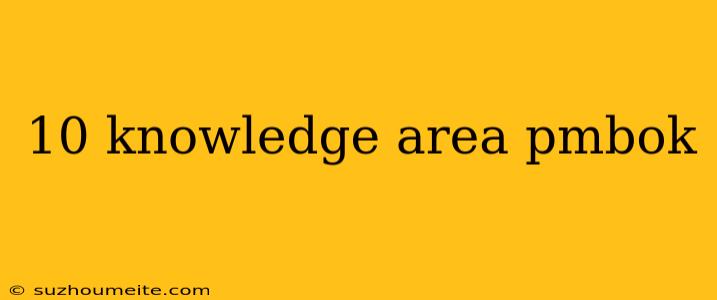10 Knowledge Areas in PMBOK
In the Project Management Body of Knowledge (PMBOK) guide, there are 10 knowledge areas that are essential for project managers to understand and master. These knowledge areas provide a framework for managing projects effectively and achieving success. Here are the 10 knowledge areas in PMBOK:
1. Integration Management
Coordinating all aspects of a project
Integration management involves coordinating all aspects of a project to ensure they arealigned with the project's objectives. It includes developing project charters, scope statements, and project management plans.
2. Scope Management
Defining and managing project scope
Scope management involves defining and managing the project scope to ensure that it is aligned with the project's objectives. It includes defining project scope, creating a work breakdown structure, and controlling changes to the scope.
3. Time Management
Developing and controlling project schedules
Time management involves developing and controlling project schedules to ensure that the project is completed on time. It includes defining project schedules, estimating activity durations, and controlling project timelines.
4. Cost Management
Establishing and controlling project budgets
Cost management involves establishing and controlling project budgets to ensure that the project is delivered within the allocated budget. It includes estimating costs, establishing budgets, and controlling costs.
5. Quality Management
Ensuring project quality
Quality management involves ensuring that the project meets the required quality standards. It includes developing a quality management plan, performing quality assurance, and controlling quality.
6. Resource Management
Planning and managing project resources
Resource management involves planning and managing project resources to ensure that they are utilized efficiently. It includes planning resource allocation, estimating resource utilization, and controlling resource usage.
7. Communications Management
Planning and managing project communications
Communications management involves planning and managing project communications to ensure that stakeholders are informed and engaged. It includes developing a communications management plan, distributing information, and managing stakeholder expectations.
8. Risk Management
Identifying and mitigating project risks
Risk management involves identifying and mitigating project risks to ensure that the project is delivered successfully. It includes identifying risks, analyzing risks, and implementing risk responses.
9. Procurement Management
Planning and managing project procurements
Procurement management involves planning and managing project procurements to ensure that the project's requirements are met. It includes planning procurements, conducting procurements, and administering contracts.
10. Stakeholder Management
Identifying and managing stakeholder expectations
Stakeholder management involves identifying and managing stakeholder expectations to ensure that their needs are met. It includes identifying stakeholders, analyzing stakeholder needs, and developing a stakeholder management plan.
By understanding and applying these 10 knowledge areas, project managers can increase their chances of delivering successful projects that meet their objectives and stakeholder expectations.
